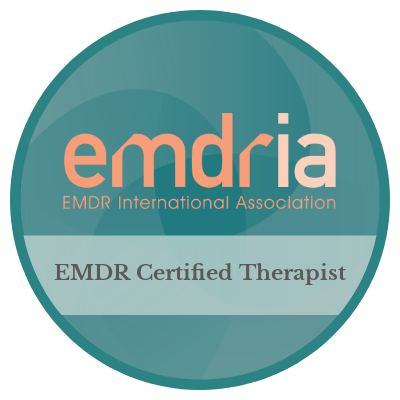EMDR Therapy
Eye Movement Desensitization and Reprocessing (EMDR) therapy is a powerful tool to help you heal from trauma and difficult experiences. It leverages your brain's natural ability to process memories, helping you gain clarity and emotional stability.
Unlike traditional talk therapy, EMDR therapy incorporates bilateral stimulation, such as side-to-side eye movements, gentle taps, or sounds, to unlock and reframe distressing memories. This process can reduce the emotional charge of traumatic events, empowering you to move forward with confidence and resilience.
How Does EMDR Therapy Work?
In our EMDR sessions, I will guide you through revisiting specific memories while incorporating bilateral stimulation. This technique allows your brain to process memories in a way that reduces their emotional intensity.
Each session is tailored to your unique needs, following a structured, evidence-based protocol. Together, we’ll create a plan that prioritizes your goals and helps you build the life you want.
Healing Through EMDR Therapy
I use Eye Movement Desensitization and Reprocessing (EMDR) to help my clients process and heal from traumatic memories and distressing experiences. By guiding clients through bilateral stimulation, such as rhythmic eye movements, I facilitate the brain’s natural ability to reprocess stored memories, reducing their emotional intensity.
In our EMDR sessions, I’ll guide you as we focus on specific memories while incorporating bilateral stimulation. This evidence-based technique helps diminish the impact of negative emotions and cognitions, replacing them with healthier perspectives. With a structured yet personalized approach, we’ll work together to help you heal and build a path toward emotional well-being.
Who Can Benefit from EMDR Therapy?
EMDR therapy is widely known for its effectiveness in treating Post-Traumatic Stress Disorder (PTSD), but it also addresses a variety of other mental health challenges, including:
- Anxiety
- Depression
- Obsessive-Compulsive Disorder (OCD)
- Dissociative Disorders
If you've experienced trauma or are burdened by unresolved emotional pain, EMDR therapy could be the transformative step you need.
Benefits of EMDR Therapy
Some of the potential benefits of EMDR therapy include:
- Reduced distress from traumatic memories
- Greater emotional stability and clarity
- Improved self-esteem and relationships
- Freedom from patterns rooted in past experiences
- Enhanced overall well-being
Is EMDR Therapy Right for You?
You may find EMDR therapy beneficial if:
- Traumatic events or chronic stress still affect your daily life.
- Traditional talk therapy hasn't fully addressed your needs.
- You're seeking a holistic approach that integrates both mind and body.
- You want to process distressing emotions without relying solely on medication.
FAQ: EMDR Therapy
What is EMDR therapy?
EMDR stands for Eye Movement Desensitization and Reprocessing. It’s a therapy that helps reprocess traumatic memories to reduce emotional distress.
Is EMDR therapy effective?
Yes, EMDR therapy is backed by extensive research and is widely recognized as an effective treatment for trauma and other mental health challenges.
How long does a typical EMDR session last?
Sessions usually last between 45 and 90 minutes, depending on your treatment plan.
Does EMDR therapy work for everyone?
While EMDR is highly effective for many, it may not be suitable for everyone. I’ll assess your unique situation to determine the best approach for you.
Can EMDR therapy help with anxiety or depression?
Yes, EMDR therapy is effective for a range of issues, including anxiety, depression, and more.
What to Expect During EMDR Therapy
During your first session, I’ll take the time to understand your mental health history and identify key memories to target. Throughout the process, I’ll guide and support you, ensuring a safe and collaborative environment for healing.
The goal of EMDR therapy is not to erase memories but to help you reduce their emotional impact. You’ll learn to reframe these experiences, fostering greater resilience and personal growth.
How Many Sessions Will I Need?
The duration of EMDR therapy varies depending on your needs. Some individuals find relief after a few sessions, while others may require a longer treatment plan. After assessing your situation, I’ll provide a customized recommendation.
Jenna Hendricksen
Licensed Marriage and Family Therapist
Certified EMDR Therapist
Licensed in Florida & New York
All Rights Reserved



